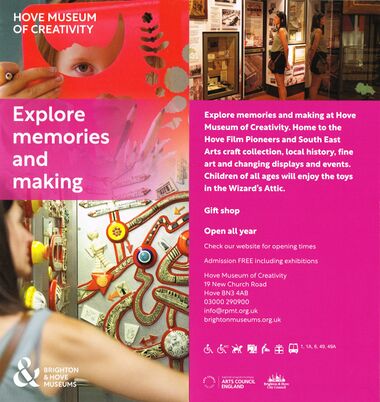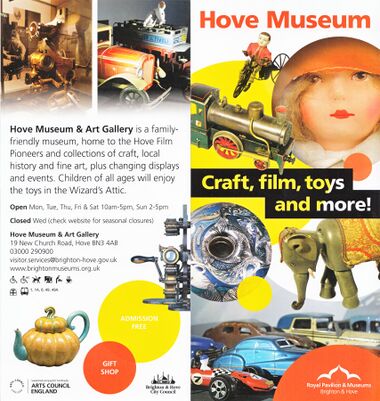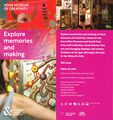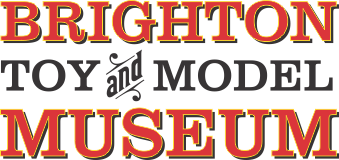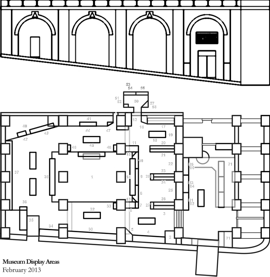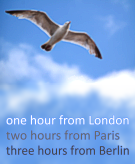Category:Hove Museum and Art Gallery
2024: leaflet with new branding [image info]
2019: leaflet [image info]
Hove Museum and Art Gallery is housed in an Italianate villa (Brooker Hall, built in 1877) set back from the northern side of New Church Road, alongside Pembroke Gardens. The museum was opened by Hove Corporation in 1927, and is part of the council-run "Royal Pavilion and Museums" group (RPM).
Museum contents
The museum has a focus on local arts and crafts, and houses a notable collection of early film equipment, reflecting the importance of the region (the stretch of coast between ~Brighton and ~Portslade) in the emergence of the fledgling film industry.
The museum also has a toy section upstairs.
Museum cafe
The museum's nice cafe was reluctantly closed by the Council in 2017, as it was felt that subsidising a cafe was not the best use of scarce council funds (Brighton not being short of other cafes).
1886/1926: The Jaipur Gate
The anomalously eastern-looking object plonked on the museum's front lawn is the Jaipur Gate, paid for by the Maharaja of Jaipur, for display at the Colonial and Indian Exhibition in South Kensington in 1886. It was moved to its current position in 1926.
The Art Ware Courts are entered through a gateway, contributed by His Highness the Maharaja of Jeypore, and carved by his subjects. The gateway is surmounted by a Nakarkhana, or Drum-house, such as is usually found over the entrance to royal residences or temples in which musicians play at stated intervals, and in regular order, certain tunes in honour of the sovereign or god.
In the kiosk on the top are arranged all the musical instruments which are usually played in a drum-house. On the front of the platform has been carved the Shamsha, or picture of the sun, which is symbolical of the descent of the lords of Jeypore, and of the Rajput chiefs of the solar race.
On the opposite side will be found a representation of the moon from which the Indrabani, the other great branch of the Rajput race, represented by the Rajas of Jaisalmir and Karauli, are said to have sprung. On tho same beam below the cornice on the front of the gate is engraved the motto of the Jeypore house, "Yato dharm stato jaya" in Sunskirt with Latin and English versions. The Latin "Ubi virtus ibi victor" better expresses the meaning of the original than the English "Where virtue is – is victory." On the corresponding beam at the back, the motto, "Ex Oriente lux," – from the East comes light, – has been carved.
The banners on the rails are respectively the panch-rang or five-coloured flag of Jeypore; a small copy of the standard given to the late Maharajah at the Imperial Assemblage at Delhi by Her Majesty the Queen Empress; the Mahi maratib or symbol of the highest nobility given by the Moghal Emperors, which was much prized. It consists of the golden head of a fish and two gilt balls, all borne on separate poles.
— , -, , Colonial and Indian Exhibition, 1886, Official Catalogue, , 1886
Address
- Hove Museum and Art Gallery – 19 New Church Rd, Hove BN3 4AB
External links
the jaipur gate
- Colonial and Indian Exhibition (wikipedia.org)
- Colonial and Indian Exhibition 1886, Official Catalogue (archive.org)
Media in category ‘Hove Museum and Art Gallery’
The following 2 files are in this category, out of 2 total.
- Hove Museum (2024).jpg 2,364 × 2,500; 1.23 MB
- Hove Museum flyer (2019).jpg 1,706 × 1,800; 609 KB
